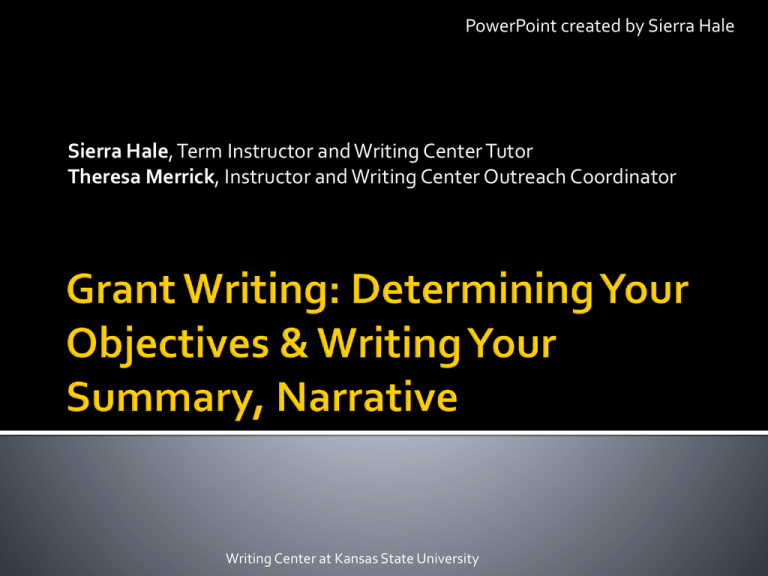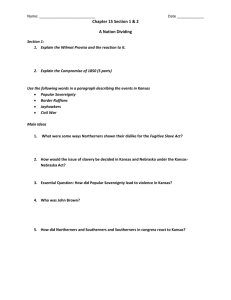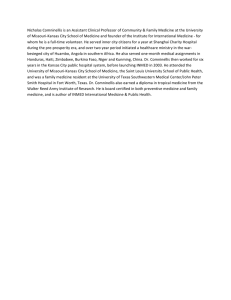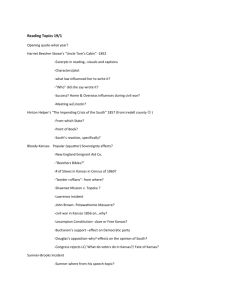Sierra Hale Theresa Merrick PowerPoint created by Sierra Hale
advertisement

PowerPoint created by Sierra Hale Sierra Hale, Term Instructor and Writing Center Tutor Theresa Merrick, Instructor and Writing Center Outreach Coordinator Writing Center at Kansas State University The first step in getting funding for your research is to determine the significance of your research outcomes. Think about what your research contributes to your… Academic Field of Study Community (local, regional, national) University or Affiliated Organization Your Career Goals The next step is to develop (some of) these contributions into measurable objectives. Writing Center at Kansas State University In order to be evaluated and understood, objectives must be specific, tangible, measurable, and achievable within a stated timeframe. First step: formulate a goal (conceptual & abstract) Second step: turn that goal into a measurable objective Example: Goal: “Our after-school program will help children read better.” Objective: “Our after-school remedial education program will assist 50 children in improving their reading scores by one grade level as demonstrated by standardized reading tests administered after participating in the program for six months.” Example from http://foundationcenter.org Writing Center at Kansas State University Take the next 15 minutes to write about your research objectives. Consider the following: What value would your research add to the academic field? (Or, what is your critical imperative?) How would your research positively impact the community outside of academia? What are the most significant impacts of your research? How can you measure these impacts? What you’ve written (the goals and objectives of your research) will form the basis of your summary and narrative. Writing Center at Kansas State University Nine-Step Proposal Conceptualization Process (Coley, Scheinberg, Proposal Writing, 1990) 1. Understand the problem 2. Brainstorm solutions 3. Identify solutions 4. Describe expected results & benefits 5. Determine tasks to accomplish solutions 6. Estimate resources needed 7. Reassess viability of solutions 8. Reassess expected benefits 9. Identify measurements of outcomes Writing Center at Kansas State University Executive Summary Statement of Need Project Description Budget Individual & Institutional Credentials Conclusion Writing Center at Kansas State University Consider your audience. Collect background information Research grant organization expectations. Understand the proposal format/genre. Practice useful writing/drafting strategies. Writing Center at Kansas State University It’s important to start by collecting background information about the organization to which you are applying. What formatting/content requirements does the organization require? What are the organization’s aims, goals, or mission? (If you can show that your research correlates with these aims/goals, your proposal will be more likely to be approved.) Pay special attention to the organization’s “Reviewer Criteria.” Writing Center at Kansas State University Snapshot of your research proposal Summarizes key information Should briefly explain: The problem your research is responding to How your research will seek to “solve” this problem What parts of the research you’ll need funding for Other aspects deemed required by the particular organization (capacity of organization, advancement of professional goals, etc.) Writing Center at Kansas State University “Meat” of the grant Provides further explanation of the following: Project’s goals and measurable objectives ▪ Critical Imperative ▪ Contribution to the field/community Research methods/procedures Any research hypotheses Process of evaluation Emphasize connections between these sections Requires content-specific subheadings Specific content requirements vary by discipline & grant organization Try to imagine and respond to any questions your readers will have about your project Writing Center at Kansas State University Potential for project to: Advance knowledge in the field Benefit society Research plan is logical, organized, and understandable Outcomes are measurable and clearly connected to the project’s goal Creativity Researcher appears well-qualified Adequate resources are available to complete the research Clear plan for utilization of research outcomes Adherence to organization-specific goals & interests Writing Center at Kansas State University Top problems: Not clearly identifying and substantiating a significant problem A lack of clarity about how money will be used for project activities Other problems: Insufficient plan for evaluating the project Time schedule is unreasonable Methods do not suit the scope of the problem (Coley, Scheinberg, Proposal Writing, 1990) Writing Center at Kansas State University Your readers will likely be composed of both academics in your field and those with little to no knowledge of your field. Some tips to help more unfamiliar readers: Provide definitions for technical/field specific terms Develop strong, pointed topic sentences Have someone outside of your field read through your work and provide feedback Writing Center at Kansas State University Aim to make your grant easy to read for “skimmers” Bold, descriptive headings Draw attention to key words or phrases Preview upcoming sections Documents that incorporate color tend to stand out Incorporate graphics and visuals if possible Writing Center at Kansas State University Establish a comfortable place to write Good lighting, physically comfortable Free of distractions Schedule time to write Keep yourself on track Notes about which sections to focus on can be helpful Start writing early! Writing Center at Kansas State University Free write to discover meaning Commonly successful technique Can help to begin with stream of consciousness style writing Begin with the focus/purpose/significance Helpful solution to writer’s block Establishes your article’s most important points upfront Outline Writing Center at Kansas State University Have others read your work Tailors to specific and general audiences Ensures clarity and audience focus Write your executive summary last Visit the Writing Center! http://www.k-state.edu/english/writingcenter/ Writing Center at Kansas State University In small groups, read through the provided grant application and discuss the following questions: What strategies does the writer employ to emphasize the project’s goals/objectives? How does the writer explain the project’s significance for the field and for society? How does the writer incorporate the project’s goals into the summary and narrative? What “moves” does the writer make to help guide a non-expert through her research? What design aspects do you notice that improve the readability of the document? What are some general strengths you notice about the proposal overall? Writing Center at Kansas State University



